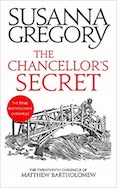 The Twenty-Fifth Chronicle of Matthew Bartholomew
The Twenty-Fifth Chronicle of Matthew Bartholomew
Murders in Cambridge town and the disappearance of several scholars give Matthew Bartholomew and Brother Michael more than enough to worry about, but the suggestion that the killers are part of the University makes the situation even more untenable. Worse yet, are the killers in league with a man who is trying to steal the election to be the new Chancellor instead of Michael?
In 1360, the Great Bridge over the River Cam is close to collapse. To repair it will cost the town and the University dear, especially if its rotten wood is replaced by more durable stone. As arguments rage over raising the money, other, equally heated, differences are coming to the boil over the election of a new Chancellor. While the majority support Brother Michael for the post, at least one of his opponents aims to seize it by fair means or foul. Then the discovery of a body under the bridge and the disappearance of two scholars throws a more sinister shadow over both disputes.
Matthew Bartholomew, the University’s Corpse Examiner, already has his hands full: due to marry in under a fortnight, he is determined to conclude his teaching duties and deal with an outbreak of the summer flux before relinquishing his official duties. With more deaths, an ‘accident’ at the bridge, and an increasing stench of corruption over the financing of the bridge’s repairs, he realises he owes more to his soon-to-be former colleagues than to his future life as a secular doctor.
But will there be enough time for him to unveil the identities of those who seek to undermine both the town and the University, or will he prove powerless to protect those he loves from death, disgrace or worse?
Amazon.co.ukHardcover Kindle EditionAudiobookWaterstonesWaterstones paperbackAmazon.comUS Kindle Edition
EXTRACT
Cambridge, early June 1360
John Baldok was pleased with himself. He had been in the castle, delivering a handsome sum of money that had been raised to repair the Great Bridge, when the Sheriff’s clerks had been distracted by a commotion in the bailey. It had happened just as they had finished recording receipt of the money their ledgers, so when they had hurried outside to watch, Baldok had seized his chance. He had grabbed the coins, shoved them up his sleeve, and strolled nonchalantly through the main gate. No one would ever accuse him of the crime. He was a burgess – one of the men who met to make important decisions about town affairs – and thus above suspicion.
Yet he did experience a small twinge of conscience. The town had struggled to pay the levy, and its theft meant people would have to dip into their purses a second time. It would cause hardship and suffering. But the ruthless side of him shrugged –it was the clerks’ fault for putting temptation his way, so any blame should be laid at their door, not his. Besides, he needed all the cash he could get these days, because his new mistress had very expensive tastes.
He grinned when he thought about Rohese. She was the Mayor’s wife, and he loved the thrill of tiptoeing into her bedchamber while Morys pored over his accounts on the floor below. The lovers were discreet, but their affair was an open secret even so. Fortunately, no one was likely to mention it to Morys, because the Mayor was a very unpopular man.
‘If you want anything done in Cambridge,’ another burgess had informed Baldok at his first guildhall meeting, ‘pay Morys. It does not matter what it is – building a new house, diverting water from the river, repairing a road, negotiating trade deals. Nothing will happen until he has had his cut. It is the way things work around here.’
‘Why was he elected if he is so brazenly corrupt?’ Baldok had asked, bemused.
The burgess shrugged. ‘He bought the votes he needed to win, and now nothing – nothing– happens until he has been paid. Being Mayor has made him very rich.’
It was an unsatisfactory state of affairs, but Baldok was disinclined to object, as he was not a very honest man himself.
Baldok reached the Great Bridge and hesitated. It had been damaged by spring floods, and should have been closed until it was repaired. Unfortunately, that entailed users taking lengthy detours, and they had objected so vigorously that the council had had no choice but to keep it open. Very heavy carts were banned, and horsemen were advised to dismount, but other than that, people were free to take their chance.
Only one other person was on the bridge that evening, because it was nearly dark and the weather was unseasonably cold. The traders from the surrounding villages had already gone home, and other than one or two priests hurrying towards their churches for compline, the streets were deserted.
Baldok began to cross the bridge, wincing as the handrail swayed alarmingly in time with his footsteps. He did not allow himself to dwell on the uncomfortable fact that repairs might have started that week if he had not stolen the money.
It was to be one of the last thoughts he would ever have.

